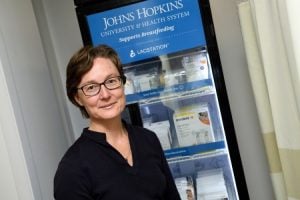
Four out of five mothers breastfeed their newborns, but that number slips to two out of five after three months. A major factor for that steep drop off is a return to work, and it’s not just because of hectic schedules.
The coordinator of Johns Hopkins University’s breastfeeding support program, Meg Stoltzfus received countless phone calls from mothers who had forgotten a part to their breast pump. Though happy to help, Stoltzfus recognized that racing across campus to deliver missing parts wasn’t a sustainable solution.
Inspiration struck Stoltzfus while at an airport where she saw a vending machine selling electronics and wondered, “Why not breast pump supplies?” Soon after, Stoltzfus entered the Social Innovation Lab where she developed the startup Lacstation, a vending machine that provides supplies and support to breastfeeding moms.
Having solutions like these in the workplace decreases employee stress, lowers health care costs, builds the employer’s reputation as family-friendly workplace and keeps women in the leadership pipeline. Already in use at the Johns Hopkins Hospital, Stoltzfus is aiming to have 10 companies install Lacstation vending machines by the beginning of 2018.
Below, Stoltzfus describes Lacstation and her journey as a Baltimore entrepreneur.
In 5 words, what does your company do?
Support breastfeeding moms at work.
What are your goals and how will you get there?
My goal is to have a Lacstation vending machine to provide breastfeeding and breast pumping supplies in every hospital and large employer in the country.
To get there, I have to prove to companies that supporting breastfeeding employees helps the company’s bottom line by increasing their ability to recruit and retain female employees and lower health care costs.
Health care organizations who implement this solution have the added benefit of being able to provide breastfeeding supplies to patients in an efficient and cost-effective manner.
Why have you chosen Baltimore as your startup’s home?
Quite simply, because it is my home. My husband and I have lived and worked in Baltimore for 19 years.
What opportunities make it a good place for growing a business?
The cost of living and working here is low and the community is very interested in seeing successes come to life in Baltimore. I believe that social entrepreneurs can have such a positive impact on Baltimore’s reputation!
In terms of startups and innovation, what’s one thing that separates Baltimore from other tech hotbeds?
The number of world-class medical institutions that we have and their interest in developing solutions for both health and community challenges.
If you could give your past self one piece of advice for creating a startup, what would it be?
Seek out a community of entrepreneurs and innovators for support.
What book are you currently reading?
I am always reading at least five books at a time. The one on the top of the pile at the moment is
The Social Animal by David Brooks.
What innovator do you look up to? Why?
I look up to the moms who contact me with their stories about how they make breastfeeding work. They are amazingly innovative!
I recently talked to a mom who forgot her milk storage bags and the piece that attaches the bags to her breast pump. She works on a campus without a breastfeeding supplies vending machine, and she was able to engineer a solution using duct tape and a Ziploc bag.
It’s after a long day of work, and you don’t feel like cooking. What is your go-to Baltimore restaurant?
Niwana. I live in Charles Village, and I love being able to walk to a restaurant for take-out.
What’s your favorite non-work-related thing to do in Baltimore?
Go for a walk to Sherwood Gardens or eat ice cream at The Charmery.